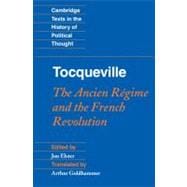
Note: Supplemental materials are not guaranteed with Rental or Used book purchases.
Purchase Benefits
Looking to rent a book? Rent Tocqueville: The Ancien Régime and the French Revolution [ISBN: 9780521718912] for the semester, quarter, and short term or search our site for other textbooks by Edited by Jon Elster , Translated by Arthur Goldhammer. Renting a textbook can save you up to 90% from the cost of buying.
| Introduction | p. xiii |
| Bibliographical Note | p. xxix |
| Chronology | p. xxxi |
| Foreword | p. 1 |
| Contradictory Judgments of the Revolution at Its Inception | p. 11 |
| That the Fundamental and Final Purpose of the Revolution Was Not, as Some Have Thought, to Destroy Religious Authority and Weaken Political Authority | p. 15 |
| How the French Revolution Was a Political Revolution That Proceeded in the Manner of Religious Revolutions, and Why | p. 19 |
| How Almost All of Europe Had Exactly the Same Institutions, and How Those Institutions Were Crumbling Everywhere | p. 22 |
| What Was the Essential Achievement of the French Revolution? | p. 26 |
| Why Feudal Prerogatives Had Become More Odious to the People in France Than Anywhere Else | p. 31 |
| Why Administrative Centralization Is an Institution of the Ancien Régime and Not, As Some Say, the Work of the Revolution or Empire | p. 30 |
| How What Today Is Called Administrative Tutelage Is an Institution of the Ancien Régime | p. 47 |
| How Administrative Justice and the Immunity of Public Officials Were Institutions of the Ancien Régime | p. 55 |
| How Centralization Was Thus Able to Insinuate Itself among the Old Powers and Supplant Them Without Destroying Them | p. 59 |
| On Administrative Mores under the Ancien Régime | p. 62 |
| How France, of All the Countries of Europe, Was Already the One in Which the Capital Had Achieved the Greatest Preponderance over the Provinces and Most Fully Subsumed the Entire Country | p. 71 |
| That France Was the Country Where People Had Become Most Alike | p. 76 |
| How Men So Similar Were More Separate Than Ever, Divided into Small Groups Alien and Indifferent to One Another | p. 80 |
| How the Destruction of Political Liberty and the Separation of Classes Caused Nearly All the Maladies That Proved Fatal to the Ancien Régime | p. 93 |
| On the Kind of Liberty to Be Found under the Ancien Régime and Its Influence on the Revolution | p. 102 |
| How, Despite the Progress of Civilization, the Condition of the French Peasant Was Sometimes Worse in the eighteenth Century Than It Had Been in the Thirteenth | p. 112 |
| How, Toward the Middle of the eighteenth Century, Men of Letters Became the Country's Leading Politicians, and the Effects That Followed from This | p. 127 |
| How Irreligion Was Able to Become a General and Dominant Passion in eighteenth-Century France, and How It Influenced the Character of the Revolution | p. 136 |
| How the French Wanted Reforms Before They Wanted Liberties | p. 143 |
| That the Reign of Louis XVI Was the Most Prosperous Era of the Old Monarchy, and How That Very Prosperity Hastened the Revolution | p. 152 |
| How Attempts to Relieve the People Stirred Them to Revolt | p. 160 |
| On Some Practices That Helped the Government Complete the People's Revolutionary Education | p. 166 |
| How a Great Administrative Revolution Preceded the Political Revolution, and on the Consequences It Had | p. 170 |
| How the Revolution Emerged Naturally from the Foregoing | p. 179 |
| Appendix: On the Pays d'état, and in Particular Languedoc | p. 187 |
| Notes | p. 197 |
| Index | p. 271 |
| Table of Contents provided by Ingram. All Rights Reserved. |
The New copy of this book will include any supplemental materials advertised. Please check the title of the book to determine if it should include any access cards, study guides, lab manuals, CDs, etc.
The Used, Rental and eBook copies of this book are not guaranteed to include any supplemental materials. Typically, only the book itself is included. This is true even if the title states it includes any access cards, study guides, lab manuals, CDs, etc.